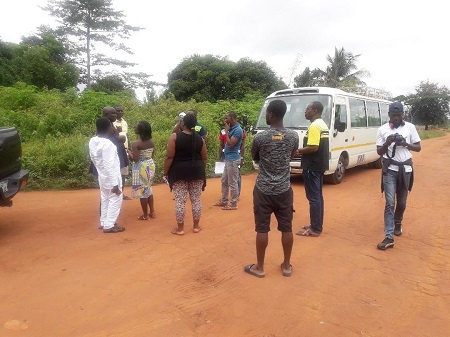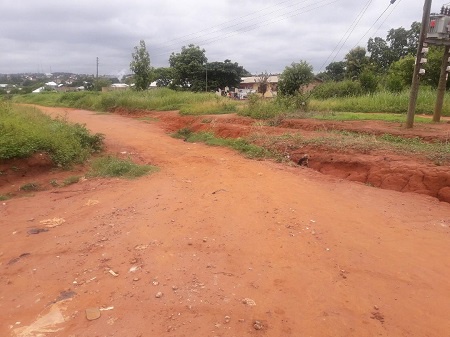A road project awarded in 2012 partly funded with oil revenue is yet to reach its original starting point though recorded with 99 per cent physical progress in the Techiman Municipal Assembly.
The Urban Roads Department of the Ministry of Roads and Highways, the Techiman Municipal Assembly and the Chief of Hansuah have given different explanations to why the project titled ‘Upgrading of Hansuah Roads and Links, Techiman’ had not been constructed at its starting point.
This came to light when the Public Interest and Accountability Committee (PIAC) and the Institute of Financial and Economic Journalist (IFEJ) sponsored by the German Development Corporation (GIZ) under the Good Governance project monitored some projects funded with oil revenue.
On Monday, May 21, the Municipal Chief Executive (MCE), the Urban Roads Department at the Municipality and at the Brong Ahafor Regional level took the team to a site where various roads and links had been constructed.
The team were taken to communities like ‘Fante Newtown,’ ‘Nyame Tease,’ ‘Di Asempa,’ ‘Dwomor’ and its adjoining communities, where constructed roads were clearly seen by the team except the abandoned ‘death trap’ drainage system.
But on Friday, May 25, Nana Apenteng Fosu Gyeabour II, the Chief of Hansuah took the team to 2 road linkages, opposite sides of the Kumasi-Techiman road, in Hansuah leading to ‘Brigade’ and ‘James Town’ communities.
In an interview, Nana Gyeabour II, said, the only work done on the two links were the spreading of gravel.
He said he had not heard of any oil funded revenue project in the area under his jurisdiction since the assembly had not engaged him on a project as such.
In a separate interview with the Mr Ernest Boom, the Maintenance Engineer of Urban Roads in Brong Ahafo he said there were no records indicating that the project had been shifted from the area working with information available to him, since he assumed office barely 5 months ago.
According to him, information gathered from the Assembly man of the area indicated that the intention for not starting the project from its actual area - Hansuah - was to finish the other links and later link them to Hansuah, adding that “it is possible and at that time they couldn’t have gone to revise the name”.
He could not confirm that the roads which were gravelled at ‘Brigade’ and ‘James Town’ were part of the original contract saying that, Kofi Job, the contractor in question had done a number of smaller contracts prior to the project under inspection.

Mr Boom noted on May 21 that the project had physically progressed to 65 per cent with 7.5 kilometres out 9 kilometres.
He said: “the road has not been diverted but I don’t know how they packaged it so I think it is the title that is misleading”, adding that the certificates were verifiable.
But information gathered from the Ministry of Roads and Highways in Accra showed that the project titled “Upgrading of Hansuah Roads and Links” had physically progressed to 99 per cent.

Mr Alex Kyeremeh, the former Municipal Chief Executive (MCE) and the deputy Minister of Education, who purportedly lobbied for the project said in an interview that the roads were to link vehicles from Kumasi to the Northern part of the country to other routes for easing traffic in the Techiman township especially during market days.
He said he was not aware of the outcome of the execution of the project since he left as an MCE to become a deputy Minister right after the commencement of work on site.
Mr Kyeremeh said he was not aware that oil revenue was a component of the funds allocated for the construction of the works saying that it was his first time of hearing that oil revenue had been used in the construction of the said road and links.
PIAC is the 13-member committee of professional groups, pressure groups and traditional and religious groups tasked with the mandate of ensuring transparency and accountability of the country’s oil revenue.
General News of Sunday, 27 May 2018
Source: ghananewsagency.org













